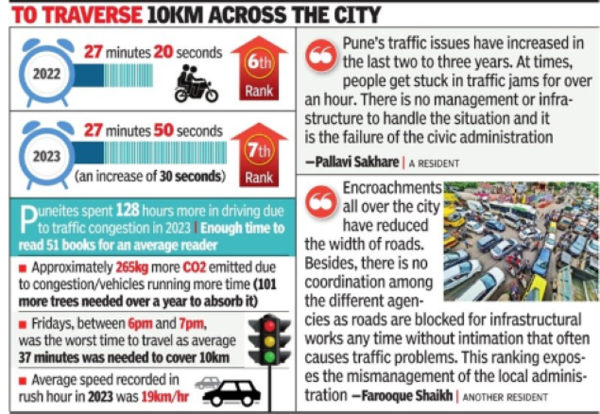According to the TomTom report for 2023, a commuter in Pune spent an average of 256 hours driving in a year during rush hour (peak hours) of which 128 hours were due to traffic congestion.
This impacted the city’s environment as an average of 1,007kg of CO2 was emitted by vehicles of which 265kg was due to congestion.

Of the four Indian cities surveyed, Bengaluru ranked sixth, Pune came seventh, New Delhi was 44th and Mumbai ranked 54th.
Pune’s rank dropped a position lower than in 2022, but the average travel time increased by 30 seconds. Experts said there is a direct connection with the population of the city, its poor transport system and the number of private vehicles on the roads.
Rough estimates indicate that Pune has close to 70 lakh people living in the municipal corporation areas with 37,50,148 vehicles as of Sunday as per RTO data.
A commuter in New Delhi spent 191 hours, a person in Mumbai 198 hours and in Bengaluru 257 hours driving in peak hours, losing 81 hours, 92 hours and 132 hours in traffic jams, respectively.
In 2022, Bengaluru ranked second with commuters taking 29 minutes and 10 seconds, New Delhi ranked 34th with people taking 22 minutes and 10 seconds as the average travel time to cover 10km while in Mumbai, which ranked 47th, they took 21 minutes and 10 seconds.
There has been a rapid decline in the traffic situation in Pune over the last few years and authorities blamed the ongoing development works in different parts of the city for the problem. Experts said building wider roads and flyovers will not solve the traffic problem. The civic administration should focus on promoting public transport to get a grip on the traffic situation, they added.
Ranjit Gadgil of Parisar, an NGO that also studies traffic problems, said the only way to solve traffic congestion is to promote public transport and build better infrastructure.
“Unfortunately, the government and the local administration is not doing anything about it. Unless the number of vehicles on roads is reduced, traffic congestion will happen. We have to implement a transport demand management policy like a parking policy and a decongestion policy to deal with this issue,” he added.
Pune police commissioner Amitesh Kumar told TOI that traffic decongestion would be his priority and the police will identify vulnerable bottlenecks which become congestion points in the morning and the evening peak hours
“We are working on an action plan to solve the issue in coordination with other planning agencies. Enforcement will be my second priority, but the main focus will be on identifying hotspots from a traffic point of view and de- ployment of our staff during congestion hours in that area,” he added.
He will start with Wagholi from Monday and has told senior officers to visit the spot and find measures to resolve the traffic crisis. “We will work on long-term plans,” he added.
The chaos is amplified in the absence of fully functional traffic signals and traffic policemen to clamp down on rule breakers.
The rising tendency to use private vehicles instead of the public transport has not only weakened the services of PMPML but also given rise to pollution levels when so many cars are idling in traffic jams. Activists’ views that the public transport needs to be fixed have gone unattended.